As the 2010 Affordable Care Act comes before the U.S. Supreme Court this week, surveys show that the public remains divided
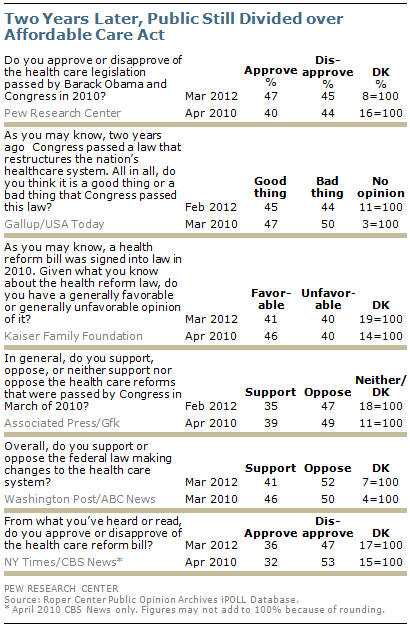
over the basic law. However, majorities continue to oppose the key element of the bill before the Court this week – the requirement that all Americans buy health insurance or face a penalty.
A review of recent polling finds that basic assessments of the law are as divided as they were when the law was passed two years ago. In the latest Pew Research Center survey conducted March 7-11, 47% of Americans approved of the health care legislation passed by Barack Obama and Congress, while 45% disapproved.
This mirrors the balance of opinion in the weeks after the bill was passed. In April 2010, 40% approved and 44% disapproved of the law. Five other major surveys conducted over the past month find similar divisions of opinion, and with little change from two years ago.
The Individual Mandate
The primary element of the law that is before the court this week – the individual mandate – is deeply unpopular with the American public. The Kaiser Family Foundation has tracked views on the provision of the law that “will require nearly all Americans to have health insurance by 2014 or else pay a fine” for most of the past two years, and has consistently found large majorities viewing it unfavorably. In Kaiser’s most recent tracking survey in March, 66% had an unfavorable opinion of the provision, while just 32% viewed it favorably.
The latest Pew Research Center survey confirms this negative
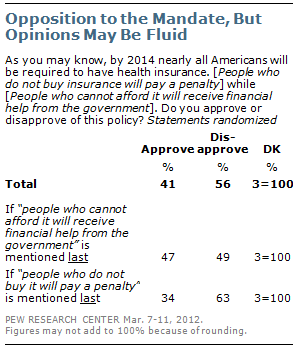
reaction, but suggests that opinion may be less firm than at first appearance. By a 56% to 41% margin, the public disapproved of requiring all Americans to have health insurance or face a penalty, even if those who can’t afford it receive financial help from the government.
Yet the poll also found that opinion about the mandate may be somewhat fluid. The survey question mentioned both the financial penalty to be assessed for those who do not purchase insurance, as well as the financial assistance the government will provide to those who cannot afford a policy. Levels of approval of the provision were highly sensitive to which aspect of the law was mentioned last.
Among those for whom the question ended with the reference to financial help, opinion on the mandate was evenly divided (47% approve, 49% disapprove). But among those who heard about the penalty last, more disapproved than approved (63% vs. 34%).
Mixed Views on Legislative Repeal, Court Rejection
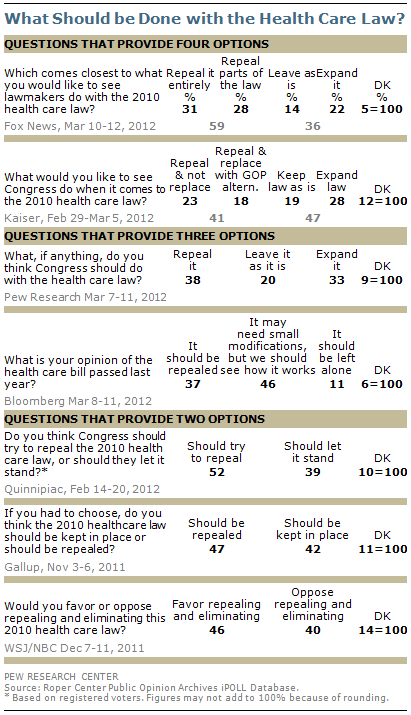
While the division of opinion over the Affordable Health Care Act is fairly consistent across major polling organizations, the level of support for repealing the bill varies widely depending on how survey questions are asked. Across seven major surveys conducted within the past five months, two found majorities favoring at least a partial repeal, three others found minorities backing repeal, and two others found a roughly even division of opinion.
The effect of question wording is particularly evident in a comparison of recent polls by Fox News and the Kaiser Family Foundation, both conducted within the past month.
The Fox News survey found 59% in favor of some kind of repeal, either repealing the law entirely (31%) or repealing parts of the law (28%). Yet the Kaiser survey found just 41% in favor of repeal; 23% said they favored repealing the bill and not replacing it, while 18% favored repealing it and replacing it with a Republican-sponsored alternative. Unlike the Fox News poll, the Kaiser survey asked respondents about what may replace the law if it is actually repealed.
Even the number of Americans who support making no changes to the Affordable Care act can vary substantially depending on the question. The Pew Research Center’s March survey found little support for the status quo: Just 20% favored leaving the health care law as it is, with most supporting either repealing (38%) or expanding (33%) the law.
Yet another survey conducted at the same time found more than half favoring the status quo when phrased differently. The March Bloomberg News poll found 46% saying it may need small modifications, but we should see how it works, and
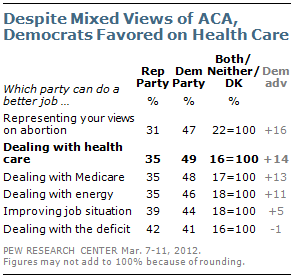
another 11% saying the law should be left alone. In this question, 37% favored repealing the law.
Some of the public’s ambivalence about the Affordable Care Act reflects the lack of clarity about what the alternative to it might be. As the Kaiser Family Foundation surveys have found, relatively few support eliminating the law and having nothing to replace it. But the survey also finds that a Republican alternative also garners little support.
This may reflect the fact that while the health reform bill meets with a mixed reaction, the Democratic Party holds a significant advantage over the GOP as the party better able to deal with health care. The latest Pew Research Center survey found 49% saying the Democratic Party can do a better job dealing with health care, while just 35% favored the Republican Party.
Similarly, recent surveys show sharply different results over what Americans want the Supreme Court to decide this year. A recent Fox News survey found the public divided evenly over whether the Court should invalidate the health care law as
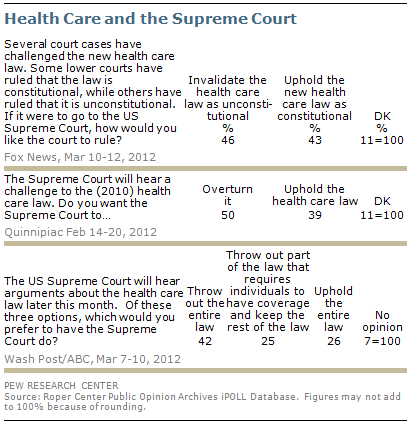
unconstitutional, or whether it should uphold the law as constitutional (46% vs. 43%).
A February Quinnipiac survey found slightly more favored overturning the law (50%) than upholding it (39%). But a Washington Post/ABC News survey found two thirds (67%) in support of the Court invalidating all or part of the health care law – 42% said the entire law should be thrown out, while 25% said just the individual mandate should be thrown out. Only about a quarter (26%) said the entire law should be upheld.




